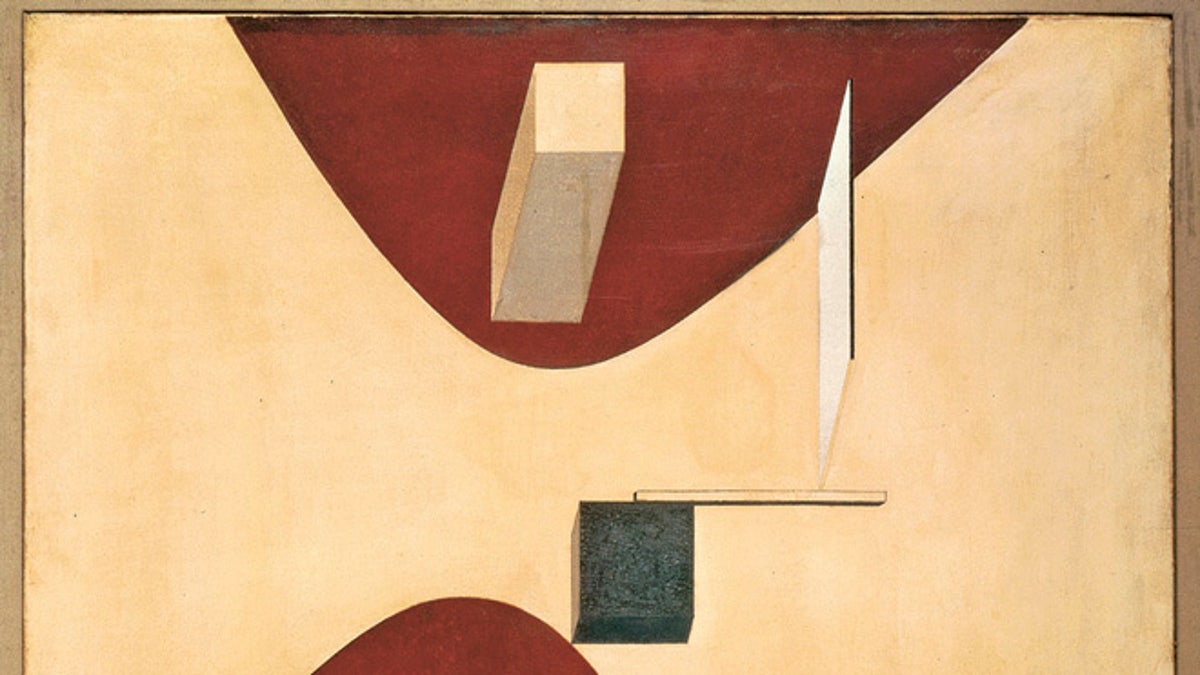
Oct. 29, 2013: This undated photo provided by Van Abbemuseum in Eindhoven shows the 1919 painting Proun P23, no. 6 by El Lissitzky. A major investigation into whether art hanging in Dutch museums may have once been Nazi loot has yielded a large result: 139 suspect works, including ones by masters like Matisse, Klee and Kandinsky, according to The Associated Press. (AP)
The State Department is calling for greater transparency from Germany in returning Nazi-confiscated artworks discovered in a Munich apartment to their rightful owners, The Wall Street Journal reported Wednesday.
The U.S. plans to ask Germany to publish the full list of more than 1,400 recovered works and will push the country to change its 30-year statute of limitations, which could make it difficult for heirs to the original owners to reclaim the works, a U.S. official told the newspaper.
More than 1,400 artworks — some by modern masters such as Marc Chagall, Henri Matisse and Pablo Picasso — were found in 2012 stacked in the Munich apartment of an elderly man. For families whose treasures were stolen by Germany's Nazi regime, the discovery has raised hopes — but also stirred frustration.
Citing an ongoing tax probe into the apartment's resident, German authorities have not revealed many details about the vast majority of the paintings, drawings, engravings, woodcuts and prints they have found. At a news conference Tuesday, officials described only a fraction of the spectacular find, including — tantalizingly — previously unknown paintings by Matisse, Chagall and German artist Otto Dix.
The reported push for greater transparency from the U.S. comes as legal experts say restrictive German property laws could prevent the works from being returned to earlier owners, according to The Wall Street Journal.
Under current German law, there is no basis for what the Nazis termed "degenerate art" to be returned to their rightful owners. Lawyers filing restitution claims must be able to provide evidence that the artworks were acquired under duress, according to the report.
German daily Die Welt ran a front-page editorial on Wednesday calling for the German Parliament to revoke the statute of limitations involving looted art and declare all the sales contracts involving such works null and void, the Journal reported.
If "the greatest theft in the history of art would, as far as possible, be completely revoked, it would be a late return to justice," the commentary said.
On Wednesday, a lawyer for the family of the late Parisian art dealer Paul Rosenberg said he was "in the process of submitting a claim" for one of the most spectacular works, a Matisse painting of a seated woman.
"I fully expect when they get my claim letter they will invite me to Munich" to negotiate its return, Chris Marinello, director of the London-based Art Recovery International, told The Associated Press.
Rosenberg lost hundreds of artworks when the Nazis invaded France in 1940. His relatives, including granddaughter Anne Sinclair — the French journalist and ex-wife of former International Monetary Fund chief Dominique Strauss Kahn — have sought for decades to retrieve them.
The Munich trove was found in early 2012 at the home of a man whom German officials didn't name but who has been identified in media reports as 80-year-old Cornelius Gurlitt. His father, Hildebrand Gurlitt, was an art dealer who acted for the Nazis in the 1930s to sell art considered "degenerate" by the regime — including Impressionist and modern masterpieces — outside of Germany in return for cash.
Some of the works were seized from museums, while others were stolen or bought for a pittance from Jewish collectors who were forced to sell.
Gerhard Finckh, director of the Von der Heydt-Museum in Wuppertal, western Germany, called for an inventory of the Gurlitt trove to be published online quickly so museums can find out whether their stolen works are among them.
"If our works are among the discovered art, we will do everything to get them back," said Finckh, whose museum lost pieces by Dix, Paul Klee, Vassily Kandinsky and many others.
Jewish groups also have called for the works to be made public immediately.
Spokesman Steffen Seibert said Wednesday that Chancellor Angela Merkel's government favored releasing information about works that "may have been confiscated from people persecuted by the Nazis." But he gave no details or timeframe for that to happen.
That leaves people seeking the return of artworks with no quick path to restitution.
Imke Gielen, a Berlin lawyer specializing in restitution claims, said prospective claimants should approach the Bavarian prosecutors with queries about specific works. She said it was vital to prove ownership of the artwork until Jan. 30, 1933, the day the Nazis seized power. Any art lost after that is presumed to have been sold under pressure or seized, boosting the chances of restitution.
Others will turn to the Art Loss Register, which maintains a database of several hundred thousand works of stolen or missing art.
The organization's team of art sleuths, historians and legal experts was busy Wednesday trying to match works on its database with the items found in Germany. Julian Radcliffe, the register's chairman, says it has already found one match — not the Matisse — but won't say what artwork it is.
The Associated Press contributed to this report.
